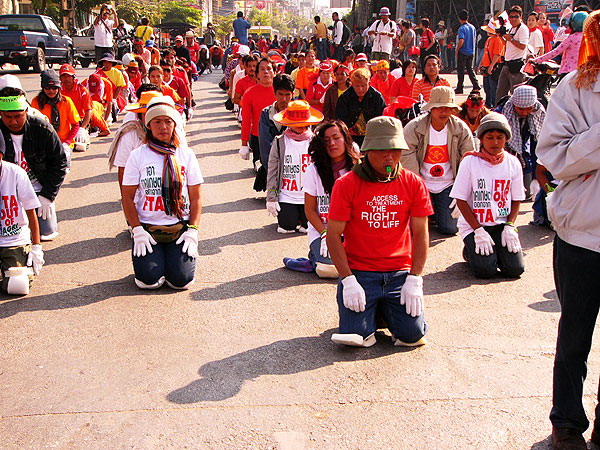Mass protest to greet EU free trade envoys

Bangkok Post | 11 Sep 2013
Mass protest to greet EU free trade envoys
Civic groups fear harm from patent clauses
About 5,000 health, consumer, and farming activists are planning a mass demonstration in Chiang Mai next week to protest against free trade talks between Thailand and the European Union.
The activists say the proposed trade pact is "unfair" and will hurt Thailand, especially in terms of access to cheap life-saving pharmaceuticals.
The first round of Thailand-EU FTA negotiations was held in Brussels, Belgium in May, and the second round will be held in Chiang Mai from Monday until Friday next week.
Several civic groups, led by FTA Watch, yesterday announced their plan to rally against the trade pact talks.
The groups said their four main areas of concern are: medicine becoming inaccessible for the poor; threats to the sustainability of farmers’ livelihoods; the promotion of excessive alcohol consumption; and arbitration to settle disputes between investors and the state.
Demonstrators at next week’s rally will come from 28 civil organisations. They will kick off their campaign on Sept 18 before moving to the Le Meridien Chiang Mai Hotel, where the trade talks are being held, the following day to submit a petition to chiefs of the Thai and EU delegations.
Aids Access Foundation representative Nimitr Tien-Udom yesterday said the move is aimed at reminding the Thai trade negotiators that they should not accept any proposals relating to the extension of drug patents and trade in biological resources.
Mr Nimitr said his group fears the EU’s proposal to extend drug patent periods would make antiretroviral drugs more expensive here.
"We are aware that Chiang Mai is a political stronghold of the red-shirt government and people might view us as anti-government demonstrators, but we would like the public to understand that we are fighting to protect the rights of people of all colours," he said.
Aids-related Rights Protection Centre Foundation director Supattra Nakhapew said the EU was demanding that medicine patents be extended from 20 to 25 years, with five years of data exclusivity.
The demands will make the price of imported medicines rise dramatically and become unaffordable for low-income earners, she said.
"If Thailand bows to the EU’s proposals, we will have to pay more money for pharmaceuticals," Ms Supattra said.
"We will also be unable to invoke Compulsory Licensing [CL], and this would jeopardise people’s access to cheap medical treatment."
Ms Supattra said CL, which allows governments to produce a patented product or process without the consent of the patent owner, is important to low- and middle-income countries as it allows the cheap production of patented medicines for domestic use in case of emergency.
Witoon Lianchamroon, director of the Biothai Foundation, a non-profit organisation working on alternative farming, said the trade deal would also extend patents on plant varieties, forcing Thai farmers to pay more for seeds.
He is concerned the EU will pressure Thailand to adopt the 1991 International Convention for the Protection of New Varieties of Plants, which would extend plant patents to between 20 and 25 years, from the current 12-20 years under Thailand’s Plant Variety Protection Act.
Mr Witoon said if Thailand bowed to EU pressure, the price of crop seeds could triple.
FTA Watch coordinator Kannikar Kijtiwatchakul said the government should not agree to the deal if the EU refused to withdraw the clauses that would put Thailand at a disadvantage.
She said Thailand could lose more than 100 billion baht per year if the EU’s demands are met.





